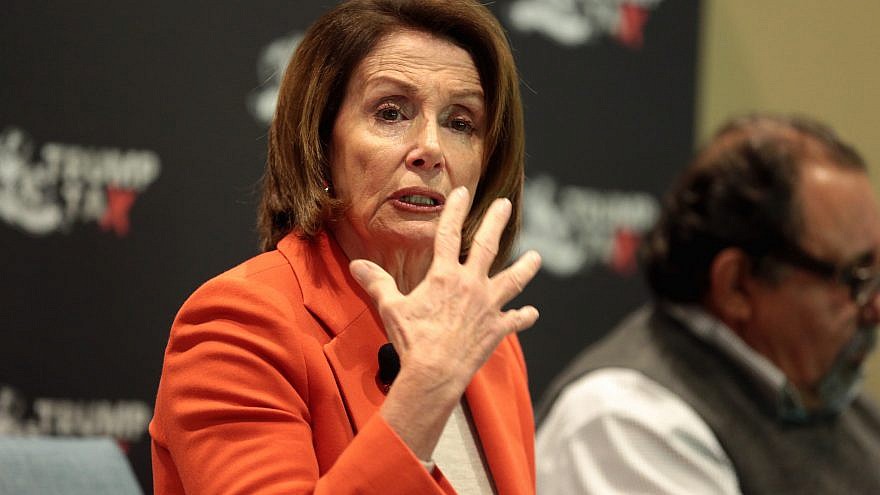Ahead of an expected vote in the U.S. House of Representatives on Thursday afternoon on a resolution condemning anti-Semitism in the aftermath of the latest remarks by Rep. Ilhan Omar (D-Minn.), Democrats are divided over a chamber condemnation, with some defending their colleague.
Over the past week, rifts have emerged within the Democratic Party over how to condemn anti-Semitism and handle the stream of remarks by Omar. In particular, many members of the party’s progressive wing, such as Rep. Alexandria Ocasio-Cortez (D-N.Y.), as well as the Congressional Black Caucus, have defended Omar and refused to consider a resolution singling her out, especially as she had been the target of anti-Muslim attacks recently.
As such, Democratic leaders sought to push for a compromise legislation that would address both the issue of anti-Semitism, while not singling out Omar. After a number of emergency meetings, a draft resolution was released on Thursday, which does not mention Omar by name, but condemns anti-Semitism and other forms of hatred, including Islamophobia.
“One resolution that addresses these forms of hatred because it’s not about her,” said House Speaker Nancy Pelosi (D-Calif.) at a press conference on Thursday.
“I feel confident that her words were not based on any anti-Semitic attitude, but she didn’t have a full appreciation of how they landed on other people,” she added. “These words have a history and a cultural impact that might’ve been unknown to her.”
[tweet id=”1103698778450771968″]
A divided Democratic House
On Sunday, Omar defended her recent remarks accusing her “Jewish colleagues” for attacking her and Rep. Rashida Tlaib (D-Mich.) for labeling every criticism of theirs as anti-Israel because of the faith of the two congresswomen, in addition to slamming her critics regarding “the political influence in this country that says it is okay to push for allegiance to a foreign country.”
That caused immediate bipartisan condemnation.
“This shouldn’t be so hard,” said Rep. Deutch, the lead author of the resolution.
“We have to address it, and I’m eager to see it,” said Rep. Josh Gottheimer (D-N.J.). “If you question someone’s loyalty to the United States of America due to their faith, that needs to be addressed.”
Rep. Juan Vargas (D-Calif.) told Jewish Insider that the inter-party dilemma is reflective of a bigger picture: “I’m starting to realize with some of my younger colleagues there is a generational divide that sometimes they don’t understand the language they’re using necessarily.”
But some Democrats appeared to dismiss the need for a resolution.
“I just think that we lose too many battles up here arguing over the stuff that’s kind of silly to argue over,” House Majority Whip James Clyburn (S.C.) told The Hill. Everybody talks about how diverse this Congress is. This Congress is not diverse; the Democratic Caucus is diverse. We’ve got 53 black people in our caucus. How many Muslims do you think are in their caucus?

He continued, “So, it’s going to be different for us.”
“I think we need to talk about white supremacy in our country very much more directly than that resolution did in the first place,” said Rep. Rashida Tlaib (D-Mich.), who has also been accused of anti-Semitism including echoing the dual-loyalty canard, on Wednesday. “And I think we’ve been heard.”
Democratic senators also came to Omar’s defense, including 2020 presidential candidates.
“We all have a responsibility to speak out against anti-Semitism, Islamophobia, homophobia, transphobia, racism and all forms of hatred and bigotry, especially as we see a spike in hate crimes in America,” said Sen. Kamala Harris of California. “But like some of my colleagues in the Congressional Black Caucus, I am concerned that the spotlight being put on Congresswoman Omar may put her at risk.”
“We should be having a sound, respectful discussion about policy. You can both support Israel and be loyal to our country,” she added. “I also believe there is a difference between criticism of policy or political leaders, and anti-Semitism. At the end of the day, we need a two-state solution and a commitment to peace, human rights and democracy by all leaders in the region—and a commitment by our country to help achieve that.”
Massachusetts’s Sen. Elizabeth Warren said in a statement, “We have a moral duty to combat hateful ideologies in our own country and around the world—and that includes both anti-Semitism and Islamophobia.”
“In a democracy, we can and should have an open, respectful debate about the Middle East that focuses on policy,” she continued. “Branding criticism of Israel as automatically anti-Semitic has a chilling effect on our public discourse and makes it harder to achieve a peaceful solution between Israelis and Palestinians.”
“Threats of violence, like those made against Rep. Omar, are never acceptable,” she added.
Warren’s remarks were condemned by Jeremy Burton, the executive director of the Boston chapter of the Jewish Community Relations Council: “The statement from Sen. Warren is deeply problematic and disappointing. Completely missed the point. This isn’t about fair criticism of Israel, this is about using antisemitic tropes targeting U.S. Jews.”
[tweet id=”1103669596870062080″]
An example of a threat against the congresswoman was an anti-Muslim poster in West Virginia incorrectly linking Omar to the 9/11 attacks; it evoked bipartisan denunciation.
“Anti-Semitism is a hateful and dangerous ideology, which must be vigorously opposed in the United States and around the world,” said Bernie Sanders, an independent senator from Vermont who caucuses with the Democrats, but is running as a Democrat in the 2020 race. “We must not, however, equate anti-Semitism with legitimate criticism of the right-wing, Netanyahu government in Israel. Rather, we must develop an evenhanded Middle East policy which brings Israelis and Palestinians together for a lasting peace.”
‘America’s Jews are watching’
Pro-Israel and Jewish groups have been pushing the Democratic Party to take a strong stand against anti-Semitism and Omar’s latest remarks, which could undermine the party’s position for criticizing Republicans and U.S. President Donald Trump for their views on racism.
There has also been a fear that by not forcefully condemning anti-Semitism, the Democratic Party could one day find itself in a similar position to that of the Labour Party in the United Kingdom, which has been beset by a massive anti-Semitism scandal under party leader Jeremy Corbyn, which has led to a number of defections and intra-party fighting.

Democratic Majority for Israel’s CEO and president Mark Mellman said that the divide among Democrats ahead of voting on the resolution is “sad, and frankly disconcerting.”
“Let’s be very clear: The issue at stake here is anti-Semitism—not support for, or opposition to, any policy of the Israeli government. Congresswoman Omar’s remarks did not mention a single policy pursued by the Government of Israel,” he said in a statement. “To suggest we are condemning her words because of her faith, her race or because she disagrees with Israel’s policies is itself offensive, as well as simply untrue and belied by the facts.”
“Specific policies of the Israeli government are, of course, open to debate here and in Israel, where they are contested daily, in a vigorous and democratic fashion,” he continued. “But instead of differing with Israeli policies, Congresswoman Omar employed dangerous stereotypes, long used by anti-Semites, to impugn the motives of her Democratic colleagues in Congress, and of other Americans, who support a strong U.S.-Israel relationship.”
“That is anti-Semitism, plain and simple,” he added.
“We see this time and again with progressive Democrats, anti-Semitism and anti-Zionism are OK in their ranks,” Republican Jewish Coalition spokesperson Neil Strauss told JNS. “It is squarely the responsibility of the Democratic Party and Jewish Democratic groups to police this.”
“America’s Jews are watching, and so far Democrats are failing them,” he continued. “The RJC believes Israel is strongest when both parties are pro-Israel; we pray that Democrats can get their house in order.”
Additionally, organizations such as the Zionist Organization of America and the Endowment for Middle East Truth have taken their condemnations one step further in calling for Omar to be removed from the Foreign Affairs Committee. Members of Congress such as Reps. Liz Cheney (R-Wyo.), Dan Crenshaw (R-Texas), Adam Kinzinger (R-Ill.) and Brian Fitzpatrick (R-Pa.) have called for such action.
“Same thing as Steve King,” Fitzpatrick, a member of the committee who won re-election last year by defeating an anti-Israel Democrat, told Jewish Insider.
King, an Iowa Republican congressman, was stripped in January of his committee assignments after he made remarks questioning how terms such as “white supremacist” and “white nationalist” have become “offensive.” A House resolution passed almost unanimously in January, condemning King explicitly and white supremacy.
At this point, no signs point to Omar being removed from the committee.


























